'Forgive them': UN hears of horrific ISIS brutality at #WeAreN Christian persecution conference
"Forgive them."
These were the words of a young Christian girl from Mosul as she died in her mother's arms after ISIS militants torched their home.

Another couple, whose children had been captured by the Islamist terror group, discovered a plastic bag on their doorstep one day. The bag contained severed body parts of their daughters and a video tape of them being raped and tortured.
These were just some among a host of horrific stories told at a conference on Christian persecution in New York last week. The three-day #WeAreN event was held for the second consecutive year and was hosted by the Vatican's permanent mission to the United Nations as well as lobby groups CitizensGo and In Defense of Christians (IDC).
One 15-year-old, Samia Sleman, told of her experience as an ISIS captive for six months. The teenager spoke through a translator about how the men and women captives were seperated. Girls as young as seven were raped and forced to convert to Islam, she said. Some older women were killed because they were not considered worthy to be kept as sex slaves.
"Why are these innocent kids and these innocent people suffering this much in that region?" Sleman said.
"Why don't we see any action being taken? Even though it's been over a year and a half now, we've seen horrible things happen to us minorities, especially Yazidis and Christians, in that region, and we don't see the international community taking concrete actions against the Islamic State."
Archbishop Bernardito Auza, papal diplomat to the UN, opened the conference with words from Pope Francis: "I continue to urge the international community to address (the) needs and those of other suffering minorities, above all by promoting peace through negotiation and diplomacy, for the sake of stemming and stopping as soon as possible the violence which has already caused so much harm...
"How much longer must the Middle East suffer from the lack of peace? We must not resign ourselves to conflicts as if change were not possible."
Dr Thomas Farr, an IDC board member and director of the Religious Freedom Project at the Berkley Center for Religion, Peace, and World Affairs, called for a safe zone to protect victims.
"Those of us with the resources and capacity must do something. Think of this as a field hospital, we must act to ensure the patient has a way to live," said Farr.
"The stakes involve the very survival of Christianity and pluralism in Iraq and Syria. To ensure their survival, the international community must consider the establishment of an autonomous, multi-religious, multi-cultural and multi-ethnic safe zone."
The US administration responded to a unanimous vote in the House of Representatives in March and labelled ISIS atrocities as genocide. However the UK government is yet to follow suit, despite a unanimous vote in the House of Commons.











